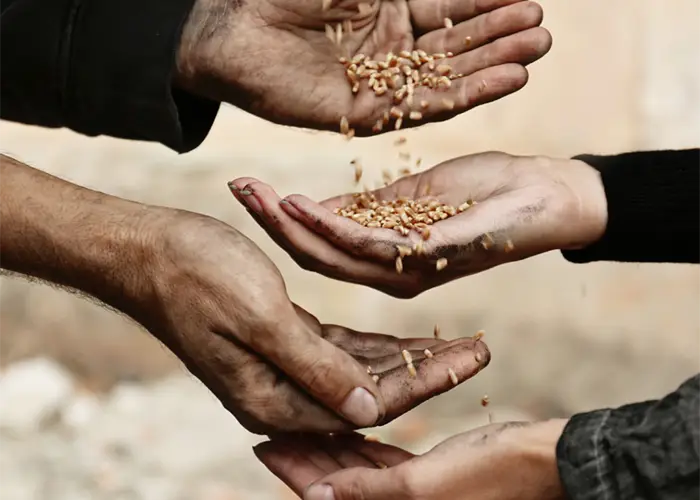Ayah Of The Week – Volume02 Issue26
Charity that Purifies: A Qur’anic Command for a Just Society
Introduction
On the first day of Muharram in the ninth year of Hijrah, the Holy Prophet Muhammad (peace be upon him and his family) issued a transformative command that would shape the socio-economic foundations of the Islamic community. The Prophet instructed his representatives to collect Zakat – an obligatory charity – from the wealth of Muslims. This divine mandate was not merely about wealth redistribution; it was a comprehensive framework to promote spiritual purification, social justice, and community solidarity. The Prophet selected trustworthy agents and sent them, with guidance and advice, to various parts of the Islamic realm. These instructions were deeply rooted in compassion, accountability, and divine wisdom.
The Qur’anic verse, Surah al-Tawbah (9:103), emphasises both the purification of wealth and the elevation of the soul through Zakat. It sets a foundation for societal equity, helping the poor, freeing slaves, supporting debt-ridden individuals, and even reconciling the hearts of adversaries. This divine system offers not only economic support but also spiritual and emotional healing as principles that hold profound relevance even today. The Holy Quran says:
خُذْ مِنْ أَمْوَالِهِمْ صَدَقَةً تُطَهِّرُهُمْ وَتُزَكِّيهِم بِهَا وَصَلِّ عَلَيْهِمْ ۖ إِنَّ صَلَاتَكَ سَكَنٌ لَّهُمْ ۗ وَاللَّهُ سَمِيعٌ عَلِيمٌ ﴿التوبة: ۱۰۳﴾
“Take from their wealth a charity by which you purify them and cause them increase, and invoke [Allah’s blessings] upon them. Indeed, your invocations are reassurance for them. And Allah is Hearing and Knowing.” (Surah al-Tawbah, 9:103)
The Contemporary Relevance of the Verse
This verse of the Qur’an is not confined to history, it is a living guide for modern Muslims navigating a complex world. It invites reflection on the ethics of wealth, the responsibilities of spiritual leadership, and the centrality of compassion in Islamic teachings. For today’s fragmented societies, especially Muslim communities living in secular or Western contexts, this verse offers a moral anchor. It reminds every believer – from youth to elders, from laypeople to scholars – that charity is not merely a duty, but a means to spiritual and communal elevation.
Practical Messages of This Ayah for Teenagers and Young Adults
1. Wealth is a Trust, Not Ownership
Know that a part of your earnings, gifts, or possessions belongs to the poor. Zakat is a system that ensures your wealth is shared with those who truly need it.
Challenge: Each month, donate part of your allowance to a local charity or a classmate in need.
2. “Purification Is Not Just for the Body”
Just as you maintain your physical hygiene, your soul needs cleansing. Zakat is a spiritual detox that helps cleanse arrogance and selfishness. It reconnects you with the struggles of others and nurtures empathy, humility, and gratitude in your heart.
Challenge: After each donation, reflect for a few minutes on how it impacts your soul.
3. Every Gift Has a Responsibility
Zakat isn’t only about money. Knowledge, health, and influence are also blessings. Each requires you to give back. Share your knowledge, help the sick, and defend the truth.
Challenge: Tutor someone for free this week or help someone facing bullying or mental health struggles.
4. Private Giving Builds Sincerity
In a world full of public displays, giving quietly trains your soul to act for Allah alone. This verse reminds you that even what others don’t see is fully known by God.
Challenge: Do one act of charity this week that no one else knows about; just between you and Allah SWT.
Practical Messages of This Ayah for Parents
1. Teach Zakat by Practising It
According to this Ayah, purity is a prerequisite for divine blessings and Zakat is one of the ways to purify your soul. When you pay Zakat, let your children witness and learn. This embeds values deeper than lectures can.
Challenge: Share a story of your Zakat experience with your children and ask them how they would like to help others.
2. Nurture Empathy Early
Teaching children about Zakat helps them recognise that not everyone has what they have. It fosters emotional intelligence and social responsibility from a young age. Charity is not just a transaction, it’s a heart-shaping practice.
Challenge: Share a simple story with your child about someone who benefited from Zakat and ask them how they would help if they were in that situation.
3. Your Duʿā for Your Children Begins with Your Own Purity
The verse connects purification through Zakat with the impact of prayer. If you want your duʿā for your children to be powerful and effective, begin by purifying your own wealth and heart through Zakat and Sadaqah.
Challenge: Before making a heartfelt duʿā for your child tonight, reflect: have you fulfilled your financial obligations like Zakat and Sadaqah?
4. Create a Spiritually Safe Home Through Generosity
This ayah implies that the Prophet’s prayer was a source of peace and stability. Parents, too, can create sakan (tranquillity) in the home by ensuring that its foundation is built on honesty, charity, and concern for others.
Challenge: Organise a family activity where everyone donates something such as money, books, clothes; and discuss how this helps bring peace to others and to your own hearts.
Practical Messages of This Ayah for Imams and Religious Leaders
1. Teach Zakat as a Main Principle, Not a Footnote
Zakat is one of the important principles and teachings of Islam, yet it is often neglected in sermons. Make it a recurring theme, explaining its spiritual, ethical, and social dimensions.
Challenge: Deliver a khutbah dedicated to Zakat and its role in social justice next Friday.
2. Facilitate Transparent Charity Systems
The Prophet (peace be upon him) appointed trustworthy agents to manage Zakat. Today’s religious leaders must help create transparent systems for collection and distribution.
Challenge: Collaborate with your mosque committee to establish a local Zakat fund with clear reporting practices.
editor's pick
news via inbox
Subscribe to the newsletter.




